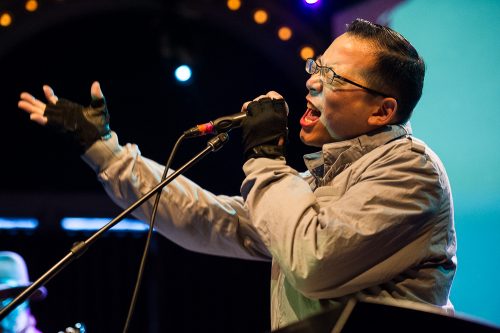Ted Wheeler (Candidate for Mayor) responded to RACC’s arts and culture questionnaire on April 22, 2016:
(1) In what specific ways have you supported arts and culture in Portland?
When I was the Chair of Multnomah County, I doubled the amount allocated in every public project to the purchasing and displaying of artwork. I served with Mayor Sam Adams on a workgroup organized by the Creative Advocacy Network that was formed to work out the details for an annual investment in local arts and culture, which ultimately influenced the creation of the Arts Tax.
On a personal level, my wife and I have financially supported numerous arts organizations and institutions. My daughter participates in Northwest Children’s Theatre and as we know participation in the arts helps children to excel in school – producing higher test scores and increasing graduation rates. I believe strongly in the importance of enhancing the left-brain/right-brain integrative approach to education. I believe strongly that an emphasis on arts education helps people to think creatively and expressively. Young people with a more well-rounded arts education will be better prepared to succeed in the 21st century at local companies as well as in high growth sectors like healthcare and construction.
(2) Artists and arts organizations add measurable value to our region’s economy, our education system and our quality of life, and yet there are a number of pressing needs in our community that often compete for attention and investment. What is the Mayor’s proper role in supporting arts and culture in the region?
The Mayor should be a proud and articulate supporter of arts and culture, as well as an advocate for growing the creative economy in our region. Moreover, they should be an accessible and active partner, seeking new and innovative ways to provide increased revenue for art programs without taking money away from other vital City programs.
As Chair of Multnomah County Commission in 2010, I doubled the funding for the arts but didn’t overly limit how the funds could be spent. We must place the value of the arts in front of the community, but not dictate how it is nurtured and developed.
(3) The region’s affordability is a serious concern for all of us, including artists and arts-related businesses. What are your plans for making housing and creative spaces more affordable?
One of the main focuses of my campaign has been on our serious affordability crisis and I recognize that our community must find effective ways to address this problem. For this reason, I have proposed the creation of a city office within the Housing Bureau dedicated to landlord-tenant affairs; a Just Cause eviction requirement; improvements that will result in more affordable housing construction; and an improved application and rental process. We must apply these same protections and parameters when possible to help keep creative non-residential space affordable, as well. The arts community is an integral part of the tapestry of the city and we must show dedication to provide artists with affordable working spaces for their creative ventures.
(4) Are there other unmet needs when it comes to shaping Portland’s arts and culture policy for the future? If so, what steps would you take to help ensure those needs are met, and how should they be funded?
Portland has been a leader in demonstrating how city government and the arts community can collaborate in creative and meaningful ways, but there is more work to be done. In large part due to the skyrocketing cost of living, artists in this city still struggle to make ends meet and often feel their voices are unheard. As mayor, I would be proactive in reaching out to the arts community and engaging in dialogue to better understand how the city can support arts and I would gladly explore potential funding avenues for art projects.
I would say that, overall, arts organizations give back to this community more than they receive, and it is time to reverse that trend. 8,000 individuals are employed in the arts community in Portland. In terms of the cultural tourism sector, 5 million individuals patronized the arts over the last year in Portland. We need to continue to grow this sector so that the arts can continue to thrive, and the city’s vitality will thrive along with it.
(5) The Arts Education & Access Fund, or arts tax, has delivered on its promise of providing arts specialists for all K-5 schools in Portland, but the fund hasn’t generated enough revenue to support as many grants for arts and culture organizations as envisioned. If elected, would you take any steps to modify the arts tax, improve administration of it, and/or fulfill the voters’ vision of supporting arts education and access through other means?
I have always supported the arts and would not advocate repealing the arts tax if I were elected mayor. However, I would like to find a better way to ensure that it’s actually being paid by all of those who can pay it and to encourage greater input from the arts community on how best to utilize the revenue it generates.
We must find an effective and efficient way to enforce collection and improve administration of the tax. It is not fair that some families dig deep to pay while others get off “scot-free.” The arts tax adds to the cultural vitality of the city, and as a result, to the overall livability of Portland. The public supported the arts tax strongly; I would like the public to be more connected to the benefits.
Back to Candidates’ page.



